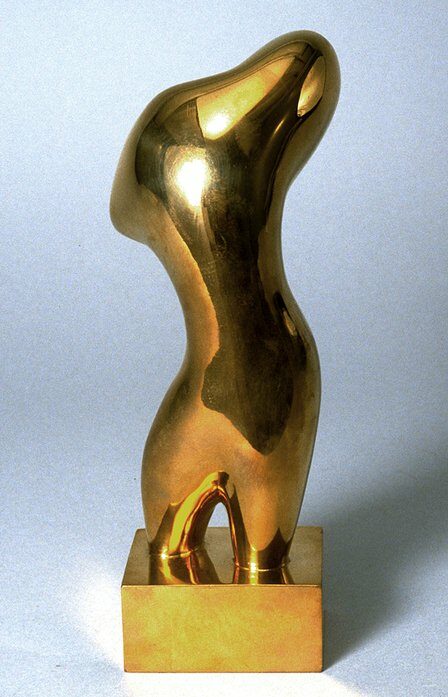Little Torso No. 5 (Torse)
Hans (Jean) Arp

Description
2014 Additions:
Jean (Hans) Arp
France, 1887–1966
Little Torso No. 5
1930
Polished bronze
Gift of the Estate of Maxine
W. Kunstadter in memory of
Sigmund Kunstadter, Class of 1922, 1983/1.399
In the spring of 1915 Arp sought refuge from World War I in Zurich, where he met fellow artist (and his future wife) Sophie Taeuber. Her abstract compositions of squares and rectangles greatly impressed Arp, and he soon abandoned the figurative style of his early work. He went on to become a founding member of Dada, an international “anti-art” movement militantly opposed to tradition and convention; he also participated actively in Surrealism, which turned away from external reality and nature to the exploration of the human subconscious.
During his Surrealist period, Arp’s investigation of biomorphism, which takes its name from the organic forms that seem to have been shaped by the forces of nature, proved to be a fertile soil for the evolution of his distinctive style. He arrived at undulating, fluid shapes such as this one, later referred to as “moving ovals,” through the Surrealist technique of automatic drawing, in which the hand moved “randomly” across the paper without conscious thought—a technique the Surrealists believed would reveal the contents of the subconscious mind. Arp’s biomorphic distortions are amplified by the polished surface of the bulbous curves of the sculpture, which distort the reflected image like a funhouse mirror
Subject Matter:
An early example of Jean (Hans) Arp's interest in biomorphic abstraction. In its attention to basic, generic biomorphic shapes the piece is a kind of study of primordial organic forms, forms suggestive of all manner of life but not representing anything specifically.
Physical Description:
A small polished bronze sculpture of a biomorphic form rising gracefully from a small base. Where it contacts the base, the form stands on two leg-like structures. The form rises from there, narrows, then opens up into a wider, more oblong shape at the top.
Usage Rights:
If you are interested in using an image for a publication, please visit https://umma.umich.edu/request-image/ for more information and to fill out the online Image Rights and Reproductions Request Form.